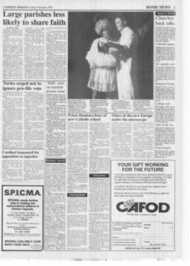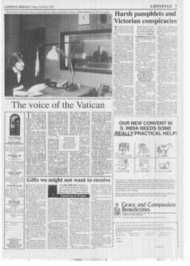Page 6, 9th October 1992
Page 6

Report an error
Noticed an error on this page?If you've noticed an error in this article please click here to report it.
Tags
Share
Related articles
Lavinia Byrne: Cardinal Winning And Section 28
Speak With One Voice...
I Empires Traitors And Christ N Action
Confusion Over Aids As A Heterosexual Disease
Why Brown's Marriage Policy The Mystery Contradicts...
Catholic ,practices Do Not Make A Catholic
The 'shock' of the new life of Jesus
Mary Kenny
I DO NOT quite know what to make of AN Wilson. He has been a Protestant. an Anglo-Catholic I think and is now an atheist. Well, we all change our minds, and 1 didn't see why that should just be a lady's privilege, though I do feel that changes of mind and heart should not proceed too swiftly one upon the other. A decent interval should elapse between apostasies.
However, he can be very amusing, and is unfailingly cordial. The last time I met him he told a funny story about the French writer Ernest Renan, who also renounced the Catholic faith. Someone asked Renan (said Wilson) if, having ceased to be a Catholic, he would now become a Protestant. and Renan replied (said Wilson): "Sir, I have lost my faith, not my reason."
Very sectarian, isn't it. in these days when we are all supposed to he so lovey-dovey? But that is what I mean when I say that I do not know what to make of ANW I never know when he is teasing, or when he is serious: is he making a statement about himself with a droll anecdote, or is he just doing it to annoy? When he trumpets a strongly held opinion, whether it be about the royal family, the Labour Party, Europe or the disestablishment of the Church of England I seem to remember he has held all shades of opinion on these matters at one time or another I am not sure whether I am supposed to be outraged or entertained.
And now comes his biography of Jesus, much trumpeted as a shocking attack on the founder of Christianity, a blasphemy and a scandal. Actually. to tell you the truth. I found it rather hard going. When you had penned a particularly boring article for a Fleet Street newspaper in my young day, the copytaker (the chap to whom you read it out over the phone) would say mournfully: "Is there much more of this. dear?" as you droned on.
Ploughing through this somewhat turgid oeuvre, the copytaker's refrain kept echoing in my head: "Is there much more of this, dear?"
Perhaps most of this biography was over my head. Perhaps the person to judge it is some biblical scholar whose days and nights are spent poring over Aramaic scripts. But surely it is aimed at the general reader? Surely, someone, like myself, who takes a middlebrow interest in what is being written about Christianity, is precisely the sort of person that Wilson's Jesus should appeal to? Sorry! Nothing doing.
It is not that Wilson has not been diligent. It is obvious that he has swotted away like anything. He has read all the books. He knows about the ethnarch Archelaus and about the Prefect of Judaea, Coponius. He has buried his busy little head in the Qumran documents and can tell you a thing or two about the Sadducees. He places great importance on the Fourth Gospel, and quite rightly underlines the Judaism of Jesus.
lie also rightly sees the importance of St Paul, which was once explained to me by a cynical advertising man thus: "Paul was the marketing man. He didn't invent the product, but he put it on the map." Wilson says of the Epistle to the Romans that it is practically the most influential book ever written. Paul wrested the religion of Jesus from the Jews and made it available to the gentile world. The usual charges against Paul that he was a misogynist (and boy! was he ever anti-gay!) are occluded.
I did not find AN Wilson's Jesus particularly blasphemous or offensive: indeed, the tone is often deferential and awe-struck. But little of Jesus the man really emerges. The prevarications about historical contexts seem to me to be beside the point. "Jesus inhabited a world which was utterly different from our own,Wilson begins. But so what? So did Plato: so did Aesop but they still make sense. Data and technology may change, but people remain extraordinarily identifiable across millennia
Wilson recognises, in a way, his own failure to understand just what the phenomenon of Christianity is: he concludes that someone right now is deciding that Jesus has come into his life and made it meaningful. and vaguely wonders why. 1 think of friends of mine who are missionaries in Nigeria Protestants as it happens. They put aside an agreeable and comfortable suburban life for themselves and their children. To meet these people is a privilege: the light of truth shines from them. How arid Mr Wilson's treatise on Jesus seems next to the joy of a living faith.
The book did send me back to the Gospels, however, as the original source material. Not only have these manuscripts inspired millions and millions of people since the start of our own era, but they have shaped every aspect of our history and culture, An MEP who sits at Strasbourg told me recently that even today, the Bible is the only truly common culture between the European nations, in the sense that every interpreter can translate quotes from the Bible, and everyone can recognise the allusions. And it is such a spiffing read. You certainly don't feel like saying to St Luke: "Excuse me, dear. Is there much more of this?" Mary Kenny is a journalist.
blog comments powered by Disqus











